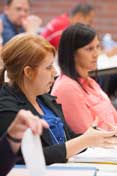Inventor Information
Basic Requirements
There are four basic requirements that a successful inventor applicant must meet:
-
Be an Idaho individual or small business – as defined in the Eligibility Guidelines below.
-
Have a qualifying household income – which cannot exceed 300% of federal poverty level for an individual as published annually by the U.S. Department of Health and Human Services. For small businesses, see below.
-
Demonstrate knowledge of the patent system – evidenced by successful completion of the online Certificate Training Course.
-
Demonstrate proof of invention – not just an idea. To demonstrate an invention, you should be able to describe the invention so that someone else could actually make and use it. CAUTION: Do not publicly disclose your invention prior to filing a patent application or at least a provisional application for a patent. A public disclosure could make it prior art against itself, resulting in an inability to secure a patent.
Eligibility Guidelines and Limitations
Please be sure to review these program eligibility guidelines below before starting your application. Once you submit your application, we will review it and contact you, either to discuss outstanding questions or to connect you with a volunteer attorney. Please note that you may be asked to provide verification of both income and compliance with other program eligibility guidelines.
Who Can Apply?
Individual Inventors who:
- are U.S. citizens or are lawfully residing in the U.S.;
- are Idaho based;
- have a total household income of less than 300% of the poverty guidelines as published annually by the U.S. Department of Health and Human Services;
- are not currently under an obligation to assign the rights to the invention;
- have possession of an actual invention, not just an idea; and
- have completed the USPTO online training module.
Small businesses that:
- are Idaho-based businesses;
- have 4 or fewer inventors, where each inventor has total household income of less than 300% of the poverty guidelines as published annually by the U.S. Department of Health and Human Services;
- had a total gross income of less than $150,000 in the preceding calendar year and expect a total gross income of less than $150,000 in the current calendar year;
- are not currently under an obligation to assign the rights to the invention;
- have possession of an actual invention, not just an idea; and
- have completed the USPTO online training module.
Other Guidelines and Limitations
Past Patenting Efforts
- We will not accept applications to handle a case that was started by another attorney.
- We will not accept an unfiled application that was partially or wholly drafted by another attorney.
- Pursuant to 37 CFR § 1.29, we will not accept any application where one of the listed inventors has been named on more than 4 previous U.S. patents or pending applications. There is a limited exception for former employees who assigned all rights to a previously issued patent or patents to a former employer.
Inventor’s Obligations
- The inventor is responsible for all official fees. These include the official patent application filing fees due at the time of filing and the issue fee that is due prior to grant of the patent. Other official fees may be included as well.
- The inventor must promptly respond to all requests for assistance from the attorney (including providing necessary signed paperwork), to prevent the need to pay late fees to the USPTO. If late fees are required because of the timing of a response to such a request from the inventor, the inventor must furnish the fees ahead of time.
- If drawings are required for a complete understanding of the invention (which is usually the case), preparation of the drawings is the responsibility of the inventor. If a professional draftsman is required, the inventor is responsible for any drafting fees.
Attorney’s Services
- The attorney will attend to drafting and filing one non-provisional U.S. patent application.*
- The attorney will prosecute the patent application at the USPTO until either (i) a response is filed to a final office action, or (ii) the application issues as a patent.*
- The attorney is not responsible for requests for continued examination, appeals, challenges to USPTO decisions in a court of law, prosecution after the events listed in (b), foreign patent applications, international patent applications, or additional U.S. patent applications.
- The attorney’s services may be expanded by mutual agreement between the inventor and the attorney, which should be in writing.
- The attorney will require no attorney fees or paralegal fees for the listed services, but may require prepayment of outside costs such as government filing fees.
- The attorney may only withdraw from representation if allowed to do so under the applicable ethical rules.
*Some of the volunteer attorneys will perform novelty or prior art searches only. In those cases, we will attempt to also match accepted applicants with a volunteer attorney who will complete the services listed in paragraphs 1 and 2 above.
Inventor Application
Disclaimer
We do our best to match accepted applicants to volunteers; however, we cannot guarantee that a volunteer will ultimately agree to take on your matter. Accepted applicants will receive the volunteer attorney services for free but will be required to pay the COSTS associated with the patent application, such as government filing fees and drafting costs.




